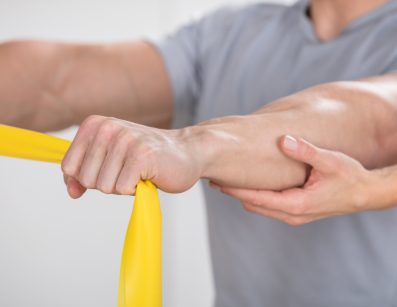How to prevent shoulder injuries in sports
The shoulder is a pretty amazing part of the body.
It’s an incredibly complex set of muscles and ligaments that produce a vast range of motions. If you’re an athlete, you’ll know that this flexibility and mobility is what makes the shoulder so powerful when you’re teeing off at the golf course or swimming a speedy freestyle stroke in the pool. But the complexity of the shoulder is also what makes it prone to injury. A shoulder injury can often develop slowly through the kinds of repetitive motions common in sports. They can become very painful and difficult to manage over time if ignored.
Mr. Soong Chua is a shoulder surgeon in Melbourne with extensive experience in treating sporting shoulder injuries. His practice supports patients managing chronic shoulder injuries through preventative treatment, exercise and shoulder surgery. Mr. Soong Chua is dedicated to educating his patients so they can lead active, healthy lifestyles.
So, what can you do to prevent shoulder injuries in sports? And if you do have a shoulder injury, what can you do about it?
Common sports that causes shoulder injuries
There are a few sports that are overrepresented in shoulder injury presentation. These tend to be sports that require repetitive overhead motions, when the arm is taken from below to above the shoulder over and over again.
Some popular sports that may increase the risk of shoulder injury are:
- Swimming
- Golf
- Tennis
- Weightlifting
- Baseball and softball
- Volleyball
Strategies for preventing shoulder injuries
Improving sports techniques: maintaining good form while playing your sport of choice is one of the most effective ways to minimise your risk of shoulder surgery. Experienced sports coaches and trainers can educate athletes in the most efficient and effective ways of executing motions such that potential damage to muscles and ligaments is reduced.
Flexibility and general strength: stretching and training towards an increased range of motion, especially in the upper body area, can help keep the shoulder free of potentially harmful strain.
Training core stability: the body is an interconnected system. While you might not think core strength is directly linked to the shoulder, in fact it can be a crucial part of maintaining equilibrium that prevents overuse. Ensure that your lumbar and cervical spine and scapulothoracic joint are not overloading and that your trunk muscles are working to support the shoulder.
Rotator-cuff control: throughout the range of motion produced by sporting activity, you want the rotator-cuff muscles to stay in a balanced position, with the humeral head on the glenoid and a stable, centered scapula.
What to do if you do get a shoulder injury
If it is not a severe injury, you should reduce your range of motion in the shoulder and undertake RICE (rest, ice, compression, elevation). You might do some gentle stretching and conditioning exercises.
If you are experiencing significant and ongoing shoulder pain, you should see a medical expert. A shoulder specialist such as Mr. Soong Chua can support your recovery through a dedicated treatment plan. Depending on the duration and severity of your injury, this can include options such as sports-specific exercises, physiotherapy and minimally invasive shoulder surgery. You will be supported every step of the way so you can return to maximum possible shoulder mobility.
Get in touch
If you’d like to discuss your options for shoulder injury treatment with Mr. Soong Chua, book here.





